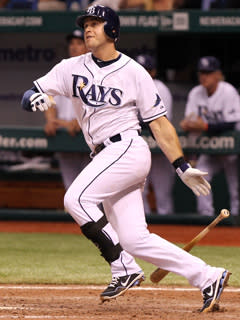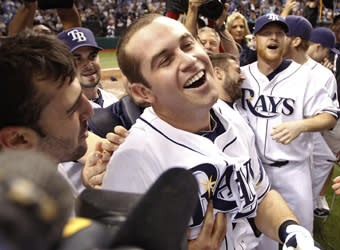Anatomy of Longoria's historic homer
ARLINGTON, Texas – When the scoreboard turned, Evan Longoria(notes) stepped out of the batter's box, shrugged his shoulders and swallowed a hearty breath. He does this in tense moments, though never had the tension so fully ensnared him. It was the 12th inning of the last game of the 2011 regular season. The scoreboard told him and everybody else at Tropicana Field that the Baltimore Orioles had beaten the Boston Red Sox, which meant all that stood between Longoria's Tampa Bay Rays and the playoffs was one run.
When Longoria exhaled and slackened his shoulders, he looked neither at the man standing 60 feet away, New York Yankees reliever Scott Proctor(notes), nor toward his dugout, brimming with excitement and nerves. He didn't glance at the crowd replete with rally caps and hope, or his bat, or his shoes, or any of the things other ballplayers use to distract themselves from the magnitude of a moment.
"I always look at the left-field foul pole," Longoria said. "It may look like I'm just glancing out there, but that's my focal point on every baseball field. When I look out there, whatever negative energy I had, or if I just want to get away from looking at what's in front of me, I turn toward the foul pole."
Turns out he was looking at destiny.
This, you must understand, would be no accident, no happy coincidence of bat meets ball. All the time in the batting cage and the video room, all the words exchanged with coaches and teammates, all the effort toward perfection of craft, or at least whatever sliver of perfection baseball offers, led Evan Longoria back into the batter's box, breath taken, shoulders loosened, focus distant.
Before he could do any of this, he needed to understand that even if there is such a thing as a flawless swing, it comes along like a shooting star, rare and savored. Longoria wanted all of his swings to be flawless until he met Ken Ravizza, who has trained athletes' brains for decades by convincing them to forget failure and embrace calm.
[Photos: Longoria, Rays celebrate walk-off homer]
Ravizza holds a Ph.D. in kinesiology and teaches at Cal State Fullerton. Longoria met him his first season playing at Long Beach State, when he was roommates with the team's shortstop, Troy Tulowitzki(notes), who had worked with Ravizza. At first, Ravizza's philosophies sounded too new-agey for Longoria – how he needed to use information to develop, support and refine mental skills. Tulowitzki told him to listen anyway.
"You've just got to buy into it," Longoria said. "A lot of the stuff he teaches may seem crazy. You listen to it, and it might go in one ear and out the other. But this game, at this level especially – you can have all the natural ability you want, but the reality is you're going to fail. And the most important thing to me is being able to deal with the failure. You go in the cage and refine your swing and give yourself tools to be successful on a physical level, but if you don't have the tools to deal with emotional stress, it's tough to overcome."
For much of 2011, Longoria struggled to reconcile his performance with his numbers. He missed almost all of April after pulling an oblique muscle. In late May, Rays manager Joe Maddon moved him to the leadoff spot to try something different. At the end of June, Longoria ditched his batting gloves for a few games. Heading into September, his batting average still lingered around .230, more the product of bad luck compounding itself over a full season than anything physical. Longoria tried not to worry. That, Ravizza said years before, did him no good.
[Related: Baseball's regular-season finales simply wild]
"He's so strong upstairs," Rays center fielder B.J. Upton(notes) said. "He's always up. We all get a little frustrated at times, but it doesn't affect him. I think if everyone could figure that out, we'd all be pretty good. Most of us can't."
The Zone is sports' version of heaven, this fantastical place to which only the most special can travel. The pearly gates are replaced by wide rims or huge nets or monster holes or inflated baseballs, and the athletes lucky enough to experience it talk with reverence, like they've seen themselves at the peak of performance and it's awe-inspiring, mystical, even godlike.
Never has Evan Longoria declared he was there, not after he slugged two home runs as a rookie in his first postseason game, not after he ran roughshod over Boston in the challenge thereafter, the 2008 American League Championship Series. The Zone implies infallibility. Ravizza told Longoria to embrace weakness and turn it into something.
It manifests in his calm. The serenity with which Longoria approaches each plate appearance belies the violence he intends to inflict upon the ball. His left leg lazes into an open stance. His soft grip waggles the bat above his right shoulder. He is not in The Zone so much as at peace.
"He is able to slow these situations down," Maddon said. "I think the better guys do. Talking about Cliff Lee(notes), just watch him pitch. He's never in trouble. I don't care what's going on, he's never in trouble. He never sweats, he doesn't change his demeanor, his look. He is able to slow the game down when it's necessary. I think a guy like Longo, even though he is young, is able to do that at the right time. I think the common denominator among those players that are able to rise to those particular moments is the fact that they are able to slow the game down."
The idea that 95-mph fastballs can look slow seems incongruent with reality, too, but it's different than The Zone. It's not so much a feeling of invincibility as it is a skill – the ability to take pressure, stress, anxiety, all of the bugaboos that can spoil a moment and sink a career, and ball them up so small and tight that they're a gumball instead of a wrecking ball.
"The bigger the moment," teammate Dan Johnson(notes) said, "the more something can slow down."
With two outs and two strikes in the ninth inning and the Rays trailing 7-6, Johnson stood in against Cory Wade(notes). The Rays had scratched back from a 7-0 deficit, manufacturing a couple runs first, then watching Longoria launch a three-run homer to cut the deficit to one. Johnson was batting .108. His season was the anti-Zone, his career a funny car that can't stop stalling. And yet he yanked a hanging changeup down the right-field line and watched it sneak over the fence to tie the score, and he couldn't stop talking about how adrenaline's effects on him run inverse: It calms him.
[Related: Rays overcame incredible odds to clinch wild card]
Every player has his method, his way of managing and coping, and Longoria needed his breath and his focal point and the reservoir of his brain.
"You remember a lot," he said. "Especially if a guy gets you. You remember how he got you, and when I faced Proctor a week ago, he got me to hit a weak groundball."
It was off a 95-mph fastball. The same one Longoria would see when he stepped back into the batter's box.
In the bullpen, they kept checking the scoreboard like a businessman does his BlackBerry. No matter how hard they tried, the Rays' relievers couldn't summon the willpower to focus on the game unfolding in front of them. When Baltimore won, they yelped.
On the Texas Rangers' bus, they obsessed over their iPads. Some of the players watched Red Sox closer Jonathan Papelbon(notes) blow the game against the Orioles. Others soaked in the giddiness in Tampa Bay when two minutes, eight seconds after Nolan Reimold(notes) crossed home plate in Baltimore, the scoreboard at the Trop finally reflected the completion of Boston's choke.
Along the Rays' bench, they marveled at what had happened. This team, dead less than a month earlier, nine games back on Sept. 3 of a Red Sox team on pace to win 99, down seven runs going into the eighth inning, needed just one more, a single shooting star.
At home plate, Evan Longoria went through his checklist.
"I just couldn't believe that Boston lost the game," he said. "I had to step out of the box, really, to comprehend what had just happened and refocus on trying to get a base hit. When I hit it, I was like, 'No way this just happened.' "
This 95-mph fastball was nine inches higher and 11 inches closer to him than the one Longoria hit into the ground six days earlier. Catcher Austin Romine(notes) was set up outside. Proctor missed his target. Longoria unfurled a perfect swing. The ball, according to Hit Tracker, was never higher than 41 feet off the ground. From the crack of the bat to the moment it landed over the 3½-foot left-field fence, the ball was airborne for 2.9 seconds. Exactly 217 seconds after Boston lost, the Rays were going to the playoffs.
[Y! Sports Shop: Show off your team support with playoffs garb]
"Do you [expletive] believe this?" Maddon said to his bench coach, Dave Martinez. "Do you [expletive] believe this?"
Nobody did. Not the baseball junkies who overdosed on the greatest night of regular-season drama in the game's history. Not the occasional fans who tuned in only to ask themselves why they don't watch more baseball. It was impossible for anyone to quantify one of the greatest home runs in baseball history during the trot.
"He owned that moment," Rays reliever J.P. Howell(notes) said. "That's not being clutch. It's different stuff. That there is a miracle. A miracle, man. That's one of the most important home runs in baseball. Ever. It was just magical."
When given a moment to consider the context, the magnitude and the gravity, even longtime observers allowed that Longoria's home run did compare to Bucky Dent's and Carlton Fisk's and, most striking of all, Bobby Thomson's. Longoria's was the first walkoff home run to send a team to the postseason since Thomson hit the Shot Heard 'Round the World in 1951 and propelled the New York Giants to the World Series.
The Rays' celebration lasted into the morning. When they reconvened to fly to Texas for their AL Division Series against the Rangers that kicks off the postseason Friday at 5 p.m. ET, a Rays employee told Longoria that the Baseball Hall of Fame wanted his bat from the home run. Perhaps the Hall will place it in the vicinity of Thomson's, which is displayed in a special exhibit.
There could be an entire wing dedicated to Wednesday night. Atlanta's collapse in the National League wild-card race. Boston's fold. And, of course, Tampa Bay's triumph. The TV in the Rays' clubhouse Thursday kept showing highlights, and as much as he tried, Longoria couldn't help but sneak a peek. It was weird, he said, looking at himself, at the euphoria that gripped his face when just seconds earlier he'd been enveloped by calm.
Evan Longoria was staring at destiny. Little did he know it was looking right back at him.
Other popular stories on Yahoo! Sports:
• Video: Can anyone beat the Phillies?
• With lockout continuing, NBA star tests Wall Street waters
• Jon Jones continues to make his move up MMA rankings


